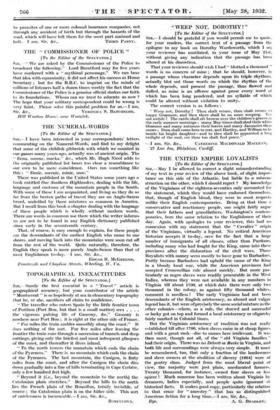THE UNITED EMPIRE LOYALISTS
[To the Editor of the SPECTATOR.] Sia,—May .be allowed to correct a slight misunderstanding of my text in your review of the above book, of slight impor- Unice on this side of the Atlantic, but liable to a miscon- struction on the other, which I should regret ? My knowledge of the Virginians of the eighteen-seventies only accounted for the statement, which they would have endorsed themselves, that, though of English blood, they were in most respects unlike their English contemporaries. Being at that time a conservative and reactionary people, one might fairly argue that their fathers and grandfathers, Washington's contem- poraries, bore the same relation to the Englishmen of their day. Again, with apologies to your reviewer, this had no connexion with my statement that the " Cavalier " origin of the Virginians, virtually a legend. No critical American historian accepts it to-day, save for the fact that a large number of immigrants of all classes, ' other than Puritans, including many who had fought for the King; came into these provinces after the dislocation of the civil wars.. Those Royalists with money seem mostly to have gone to Barbadoes. Partly because Barbadoes had upheld the cause of the King in a bloody local war, while the American provinces had accepted Cromwellian ride almoSt meekly. But more par- ticularly as negro slaves were readily procurable in the West Indies, whereas they were not riailable in any numbers in Virginia till about 1700, at which date there were only two thousand in the colony, as against fifty thousand whites, comment is needless ! The early Virginians had not been descendants of the English aristocracy, as absurd and vulgar legend has it, but were of precisely the same social mixture as the other colonies—where, as a rule, the shrecid and successful or lucky got on top and formed a local aristocracy or oligarchy
fairly marked in Colonial times. • —
But the Virginian aristocracy of traditioa Was not really established till after 1700, when slaves came in at cheap figures and with a great rush.—due to causes here irrelevant. It was then most, though not all, of the " old Virginia families " had their origin. There-was no Dibrell or Burke in Virginia, and both life and surroundings were always-very simple. It must be remembered, too, that only a fraction of the landowners and slave owners at the abolition of slavery (1864) were of the gentry class. Judged from the most liberal point of view, the majority were just plain, uneducated farmers. Twenty thousand, for instance, owned four slaves or less apiece I Much nonsense has been written about Virginia by dreamers, ladies especially, and people quite ignorant of historical facts. It makes good copy, particularly the relation to that craze for " ancestrS, " that has so' distinguished American fiction for a long tinie.-4 am, Sir, &c.,








































 Previous page
Previous page